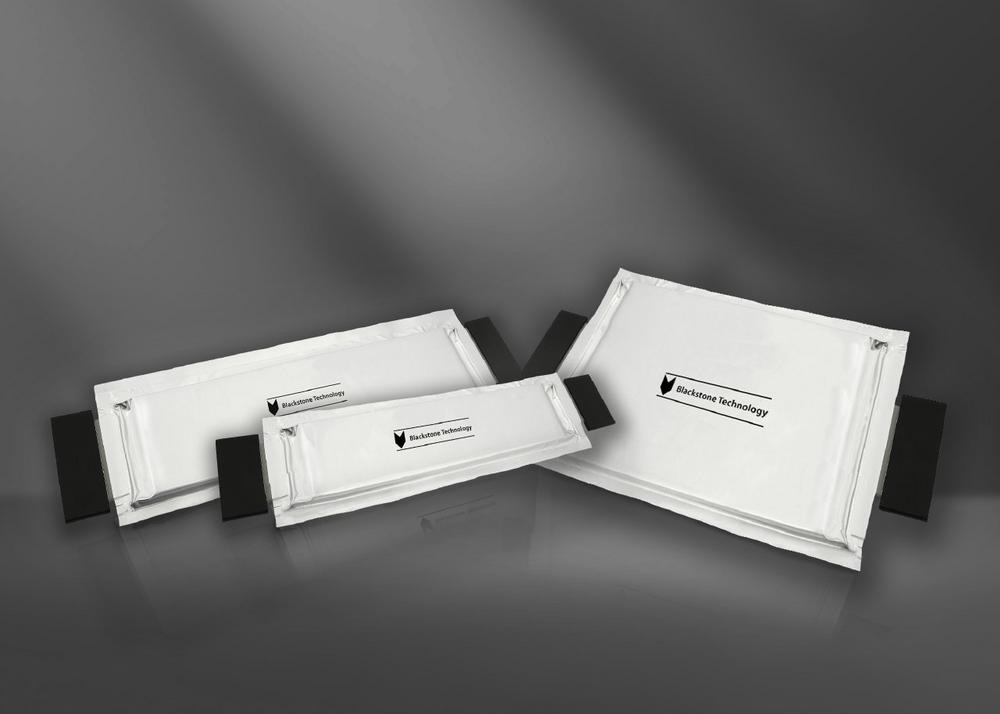During the seven-stage test, Volta Labs, the test laboratory commissioned with the procedure, subjected 33 battery cells to extremely adverse environmental conditions. The safety, durability and environmental resistance of Blackstone’s revolutionary 3D printed lithium-ion batteries has been technically proven.
Robust transportability confirmed in seven series of tests
The so-called UN 38.3 test ensures that lithium cells and batteries can be safely transported and shipped. Conditions to which the load carriers may be exposed during transport are therefore simulated. These include environmental influences such as pressure, temperature, crushing or impact. These tests are defined in the United Nations "Manual of Tests and Criteria" and are described in section 38.3 – hence the designation "UN 38.3".
Test procedures performed and passed:
T1 Altitude: In the so-called altitude or negative pressure test (Altitude Test), transport is simulated, for example, in an aircraft. No weight or stress loss occurred in any cell. All criteria were met, and the test is considered to have been passed.
T2 Thermal: In the thermal test, the cells are exposed to high temperature differences. Among other things, the cells are stored at a temperature of 72°C+/-2°C for at least six hours. There were no abnormalities during the test cycles in the climate chamber. All criteria were met and the test is considered to have been passed.
T3 Vibration: During the vibration test, the dynamic loads in all installation positions are simulated on the cells during transport. Each cell was exposed to vibration for a total of 9 hours. No abnormal behaviour was observed, and the voltage and weight did not change in any of the cells. All criteria were met and the test was considered to have been passed.
T4 Impact: During the impact test, the cell should be subjected to cumulative impacts. This sequence was performed for all three axes. No abnormal behaviour was observed. The weight and tension of the cells remained unchanged. All criteria were met and the test is considered to have passed.
T5 External short circuit: The test simulates an external short circuit of the cell. For this purpose, the cells were preheated to 60°C and the short-circuit condition was maintained for 70 minutes. After performing this test to standard on four test samples, which did not result in a significant increase in external temperature, rather cooling (external temperature 20°C), the short circuit resistance was reduced and a peak short circuit current of 600A was measured (at 4.8mOhm). Voltages were 0.4-0.7V after the load switch was opened and recovered to values between 2V and 2.7V within two hours. All criteria were met and the test is considered to have passed.
T6 Impact/squeeze: The test recreates mechanical damage by squeeze induced with a 20 ton hydraulic press. The force wine effect of the press over the punch was distributed over the cell with the help of an appropriate aluminum cuboid. The press was driven onto the cell sample at the specified speed of 1.5cm/s, and at a press force of 13.5kN the squeeze was broken off in accordance with the standard and the punch retracted. There was no stress collapse or significant deformation of the cell. All criteria were met and the test is considered passed.
T7 Overcharge test is not provided for single cells and was not required for this test series.
T8 Forced Discharge: This test is used to determine the resistance of the cells to a forced discharge condition. In this test, a fully discharged cell is forced to overdischarge using an external power supply so that it no longer supplies voltage and acts as a resistor. A maximum discharge current of 30A was selected as per specification. There was no fire or disintegration of the cell during the test and within the following 7 days. All criteria were met, the test is considered passed.
Blackstone Resources is a Swiss Holding Company, with its legal domicile in Baar, Kanton Zug, and is concentrating on the battery technology and battery-metals market and offers direct exposure to the battery-technology revolution.
Presently, Blackstone Technology builds up a production-line for small series of 3D printed batteries in Döbeln, Saxony, Germany. The short-term production will be pouch-cells with the Blackstone Thick Layer Technology © which allows a 20% higher density in lithium-ion cells, Blackstone Resources continues the program of development in solid state batteries and its production process.
Electric vehicles and batteries have driven the demand for vast quantities of these metals. Therefore, Blackstone Resources sets up, develops and manages production-refineries for battery-metals such as lithium, cobalt, manganese, graphite, nickel and copper.
Blackstone Resources AG
Blegistrasse 5
CH6340 Baar
Telefon: +41 (41) 44961-63
Telefax: +41 (41) 44961-69
http://www.blackstoneresources.ch
CMO
Telefon: +41 41 449 61 63
E-Mail: s.yilmaz@blackstoneresources.ch
![]()
